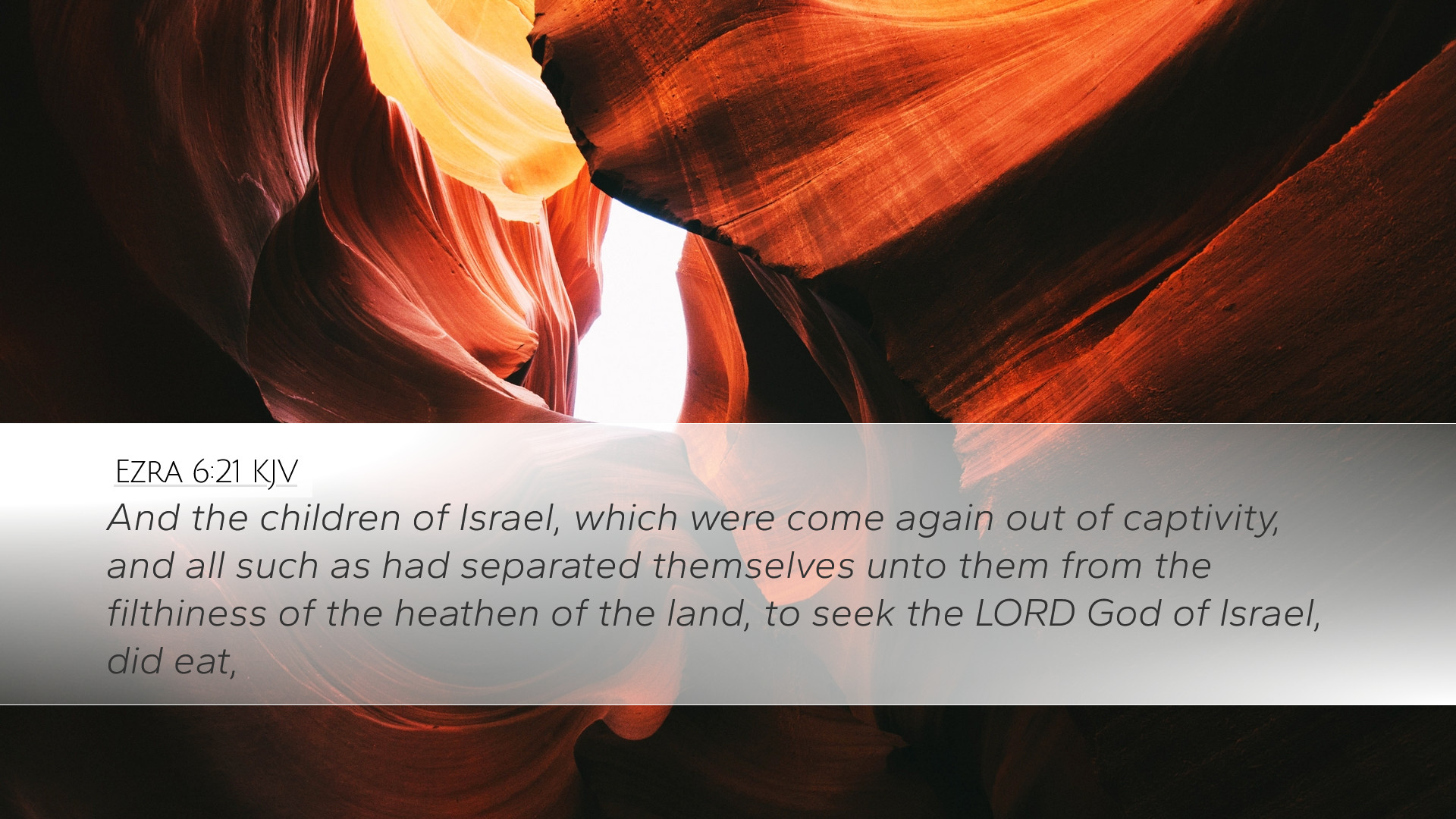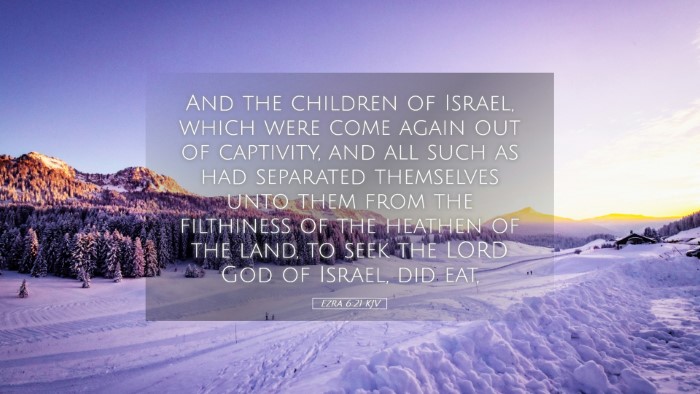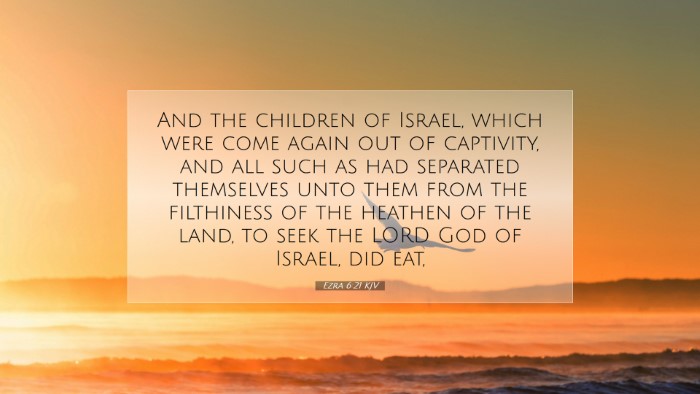Old Testament
Genesis Exodus Leviticus Numbers Deuteronomy Joshua Judges Ruth 1 Samuel 2 Samuel 1 Kings 2 Kings 1 Chronicles 2 Chronicles Ezra Nehemiah Esther Job Psalms Proverbs Ecclesiastes Song of Solomon Isaiah Jeremiah Lamentations Ezekiel Daniel Hosea Joel Amos Obadiah Jonah Micah Nahum Habakkuk Zephaniah Haggai Zechariah MalachiEzra 6:21
Ezra 6:21 KJV
And the children of Israel, which were come again out of captivity, and all such as had separated themselves unto them from the filthiness of the heathen of the land, to seek the LORD God of Israel, did eat,
Ezra 6:21 Bible Commentary
Commentary on Ezra 6:21
Ezra 6:21 states:
"And the children of Israel, which were come again out of captivity, and all such as had separated themselves unto them from the filthiness of the heathen of the land, to seek the LORD God of Israel, did eat,
This verse comes at a significant juncture in the narrative of the post-exilic community. The return from Babylonian captivity signifies a profound transformation not only of the physical landscape of Jerusalem but also of the spiritual and communal identity of the Israelites. In this commentary, insights from established public domain commentators such as Matthew Henry, Albert Barnes, and Adam Clarke will be synthesized to provide a comprehensive understanding of this scripture.
Contextual Background
The historical backdrop of Ezra 6 depicts the rebuilding efforts of the Temple in Jerusalem, with Zerubbabel leading the charge after a long period of desolation and oppression. This rebuilding was not simply a physical restoration, but also a spiritual renewal for the Jewish people.
Interpretation of Key Phrases
"Children of Israel": This phrase invokes the covenantal relationship between God and His chosen people. As Matthew Henry notes, this designation reinforces their identity and mission as a people set apart for divine purposes.
"Which were come again out of captivity": Albert Barnes comments on this phrase as a reminder of God’s faithfulness. The return is not only a geographical return but a spiritual reawakening, emphasizing the Lord's mercy in restoring His people after their exile.
"Such as had separated themselves": Adam Clarke elaborates on the act of separation as a necessary step for those who wished to return to a faithful relationship with God. This separation involved renouncing the idolatrous practices of the surrounding nations, which is vital for spiritual integrity.
Theological Insights
The gathering of the Israelites and their decision to separate themselves from the "filthiness of the heathen" highlights a central theme in Scripture: holiness. Matthew Henry points out that holiness is essential for worshipping God and that the returnees explicitly sought to align their lives with His commandments.
Furthermore, this act of separation is a precursor to genuine worship. As Barnes mentions, one cannot truly seek the Lord while clinging to the sins and corrupt practices of surrounding cultures. The demand for holiness requires both personal and communal repentance as demonstrated through their actions.
Community and Worship
In this verse, we see an emphasis on community and collective identity. The phrase "did eat" at the conclusion indicates that they participated in a communal act, likely a covenant meal or festival, symbolizing their renewed identity and fellowship with one another and God. Clarke comments that such acts of worship bind the community together, reinforcing their shared heritage and purpose.
Significance of Covenant Meals
Covenant meals were integral to the Israelite experience, symbolizing not only fellowship among the people but also their relationship with God. This act of eating together signifies their acceptance of divine grace and welcoming back into the fold after a period of separation from God due to sin.
Application for Today
For contemporary Christian communities, Ezra 6:21 speaks profoundly about the necessity of separation from worldly influences. As believers, the call to holiness remains relevant; they are encouraged to seek the Lord diligently, which involves critical reflections on what influences shape their lives and communities.
- Holiness: The act of separating from the worldly practices is a clarion call for modern believers, reflecting a desire to live lives that are pleasing to God.
- Community: Just as the Israelites came together in worship, today's believers are called to cultivate community through acts of worship, fellowship, and support.
- Seeking God: The emphasis on seeking God should be active and intentional in the life of every believer—a call to persistent prayer, scripture reading, and communal worship.
Conclusion
Ezra 6:21 encapsulates a pivotal moment in Israel's history marked by an awakening to holiness, community restoration, and faithfulness to God’s covenant. By drawing from insights offered by Matthew Henry, Albert Barnes, and Adam Clarke, we understand this verse not merely as historical narrative but as an enduring message of hope and divine calling. Thus, the pursuits of today's believers should echo the sentiments of those returning from captivity: a deep desire to seek the Lord and live in accordance with His will.


